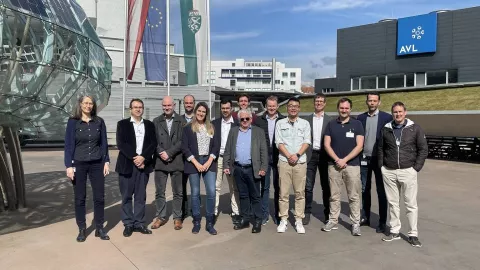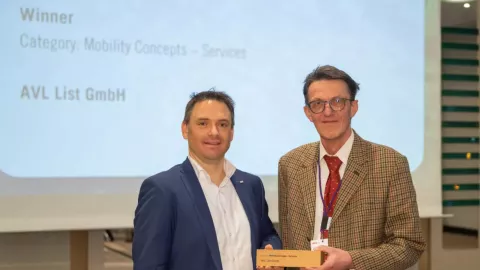Intensive research work results in fuel cell concept vehicle

As part of the Keytech4EV project, a consortium headed by AVL has developed a hybrid fuel cell/battery drive system for a demonstration vehicle. Particular attention was given to energy efficiency and cost reduction. Supported by the Austrian Climate and Energy Fund, the flagship project has now been successfully concluded after three years of intensive research activities.
As its name suggests, the Keytech 4EV project is all about key technologies for electric vehicles, and has the overall objective of creating a highly efficient, costoptimized and zero-carbon drive concept based on hydrogen fuel cell and battery technologies.
Innovative combination of two technologies
The current state of technology is represented by vehicles with either large fuel cell systems and very small buffer batteries, or with pure battery-electric systems. The innovative approach taken by the Keytech4EV project is to combine both technologies into a single, hybridized, overall system that utilizes all synergies. Pre-studies have shown that, compared to both pure fuel cell systems and pure battery solutions, this type of fuel cell/battery hybrid is able to reduce drive system costs significantly, and is also much better suited to fulfil all the requirements (efficiency, drivability, etc.). In addition, the fuel cell/battery hybrid has the benefit of delivering long range and short refueling times. This means that the drawbacks of pure battery electric vehicles, such as limited range and lengthy battery charging times, are avoided altogether.
Tightly integrated project, and parallel research activities
Following a horizontally and vertically tightly integrated organization structure, Keytech4EV was headed by an industrial powertrain-engineering provider (AVL) in cooperation with component and subsystem manufacturers (Hoerbiger, Magna, ElringKlinger), research institutions (TU Graz, TU Wien, HyCentA) and IESTA (SME). Starting with a common concept, the project involved parallel research efforts, leading to the development of central core technologies to be employed in the drive system.
Hoerbiger developed the hydrogen injection valve and, in collaboration with HyCentA, worked out the passive hydrogen recirculation system. Magna designed a hydrogen storage vessel for the center tunnel, and supplied the vehicle’s hydrogen storage vessel system. HyCentA was responsible for the calculation and simulation of refueling processes. ElringKlinger refined its fuel cell platform in order to achieve a fuel cell output of 70 kW. TU Graz assisted with durability testing. AVL developed the entire fuel cell system including its control unit and, in cooperation with IESTA, the fuel cell cooling system. TU Vienna took charge of model development for fuel cell state monitoring during operation.
Finally, all core technologies were integrated and validated at system and vehicle level by AVL.
The final project goal was the development of a hybridized fuel cell/battery demonstration vehicle. The full-featured, medium-sized vehicle serves to demonstrate the following goals:
Energy efficiency equivalent to the fuel consumption of 2.5 l/100 km gasoline in a C/D medium-sized vehicle
Reduced powertrain costs
Zero CO₂ emissions
Range > 500 km
Driveability equivalent to comparable series vehicles
Another central motivation for this project was to contribute to the creation of a national/European value added chain for fuel cell technology. The participation of five major global passenger car manufacturers as associated project partners underscores the project’s innovative nature and market-oriented goals.
About the Austrian Climate and Energy Fund’s energy research and innovation programs
The energy research and innovation programs offered by the Climate and Energy Fund (Klima- und Energiefonds) are central tools for the implementation of the Austrian Federal Government’s National Energy and Climate Plan, thereby contributing significantly to Austria’s long-term economic success. Since 2007, the Climate and Energy Fund, in cooperation with the Ministry of Infrastructure, has invested around 400 million euros in more than 800 energy and mobilityrelated research projects. The strategy is specifically geared to technologies with high growth potential, both nationally and internationally. As a one-stop shop, the Climate and Energy Fund provides research and environment funding instruments throughout the entire innovation process, from research to demonstration.
Information: www.energieforschung.at and www.vorzeigeregion-energie.at
Press contact
E-mail: press@avl.com
Mag. Katja Hoyer
Climate and Energy Fund Press Spokesperson
Cell phone: +43 664 886 13 766
E-mail: katja.hoyer@klimafonds.gv.at
For more news and videos about the Climate and Energy Fund, see Twitter, Instagram and YouTube.
STATEMENTS
Federal Minister Leonore Gewessler
“It is my aspiration that we must make the transition to zero-emission mobility. Only then will we be able to reach our energy and climate objectives. This means that concentrated research efforts are needed to address the issue. The project team has proved that innovations made in Austria can make an important contribution to meeting this challenge. I would like to express my sincere thanks to the entire team for their commitment and innovative power, and to the Climate and Energy Fund in its role as competent partner to the bmvit (Federal Ministry of Climate Action, Environment, Energy, Mobility, Innovation and Technology).”
Prof. Helmut List, CEO AVL
“The electrification of the automotive drive system is absolutely crucial to achieving carbon neutrality in future transportation. Fuel cell systems serving as efficient and clean energy converters from hydrogen to electricity in electric passenger cars and trucks will gain greatly in significance, because hydrogen fuel cell vehicles enable CO2-free mobility, long ranges and short refueling times. By employing a novel combination of fuel cell and a deliberately larger battery to create a fuel cell/battery hybrid – Austria’s very first fuel cell vehicle – the project team has made a huge step forward toward high efficiency, attractive drivability and good cost effectiveness.”
Theresia Vogel, Climate and Energy Fund
“For us to remain competitive in the global market, it is paramount for Austria’s automotive industry to put innovative technologies 'made in Austria' swiftly on the market. When it comes to emission-free mobility, green hydrogen will matter at an international level too – so it’s all about achieving efficiency and range. Projects like this one, which we support with our energy research program, secure Austria’s position as industry location, and help us reach the European climate goals.”
FACT SHEET
Project Keytech4EV:
The flagship project Keytech4EV demonstrates innovative key technologies for hydrogen fuel cell electric vehicles with a special focus on energy efficiency and costs.
This project (FFG number 855237) is funded by the "Climate and Energy Fund” and carried out as part of the “Energy Research Program 2015”. The program is managed by the Austrian Research Promotion Agency (Österreichische Forschungsförderungsgesellschaft, FFG).
Project period:
February 2017 to January 2020
Consortium leader:
AVL
Partners:
AVL
ElringKlinger
Hoerbiger
HyCentA Research GmbH
IESTA
Magna
TU Graz
TU Vienna
Total cost of project:
5.81 million euros
Funding by Climate and Energy Fund:
3.59 million euros
Drive concept:
The heart of the Keytech4EV drive system is a 70-kW fuel cell, with which the vehicle achieves maximum speed and gradeability. Together with a battery with ~10 kWh of capacity, the system delivers maximum efficiency, outstanding acceleration and good drivability.
Further features of the C-Class demonstration vehicle:
100 kW e-motor
~4 kg hydrogen for a range of 500 km
~3 minutes hydrogen refueling time
0.8 kg/100 km hydrogen consumption
Key technologies:
AVL fuel cell system
PEM fuel cell stack (ElringKlinger)
Passive anode recirculation (Hoerbiger)
High system efficiency
AVL THDA™ diagnostic-based fuel cell control system
Hardware and software
Total Harmonic Distortion Analysis (THDA)
700 bar hydrogen tanks (Magna)
New center tunnel tank
Lowering of costs due to reduced complexity
With more than 12,200 employees, AVL is one of the world's leading mobility technology companies for development, simulation and testing in the automotive industry and in other sectors such as rail, shipping and energy. Based on extensive in-house research activities, AVL delivers concepts, technology solutions, methodologies and development tools for a greener, safer and better world of mobility and beyond.
AVL supports international partners and customers in sustainable and digital transformation. The focus here is on the areas of electrification, software, AI and automation. AVL also supports companies in energy-intensive sectors on their way to green and efficient energy generation and supply.
AVL's passion is innovation. Together with an international network of experts spanning 90 locations with more than 50 competence and development centers worldwide, AVL is driving the future of mobility. In 2024, the company generated a turnover of 2.03 billion euros, of which 11% was invested in R&D activities.
For more information: www.avl.com

- EN,

- EN,

- EN,

- EN,
Stay up-to-date as a journalist with our latest press releases concerning company updates, research projects, our latest developments, and more.
Download our fact sheet to get a comprehensive overview about what we do as well as our latest company figures.
Get in touch with our Press-Team
For all press and media enquires please email:
